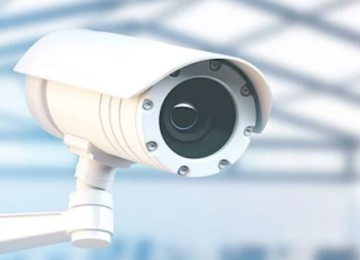How to choose between an analogue camera and an IP camera for your CCTV system?

Choosing between an analogue camera and an IP camera for a store can be a difficult decision. Whereas analogue cameras have been considered to be the norm for a long time, IP cameras offer technological advantages that are hugely beneficial for video surveillance in stores. To help you make the right choice, Veesion is here to show you the key factors to consider when selecting your surveillance camera model.
1. Image quality
Image quality is one of the most important criteria when choosing the right video surveillance system. IP cameras offer a better image quality than analogue cameras given their higher resolution and their ability to capture more precise details. IP cameras effectively provide high-definition images. This is an important point in environments where visibility is essential, such as in the key aisles of your store. For example, better image quality will make it easier to recognise shoplifting individuals.
2. Camera cost
Analogue cameras are generally less expensive than IP cameras. However, the cost can vary depending on the product specifications, the image quality, features, security characteristics, maintenance requirements, overall storage costs and many other factors. It's essential to find a good value-for-money ratio that establishes a balance between cost and quality in order to make sure that your video surveillance system is profitable. Of course, in stores, the main interest is reducing your inventory shrinkage. It's therefore important not to blow up your budget and invest in security equipment that isn't suited to your needs.
3. Ease of installation
Ease of installation is another important factor to consider when choosing between an IP camera model and an analogue model. Analogue cameras are easier to install and set up. Generally, you'll just need to use a wire to connect the camera to a video surveillance recorder. For IP cameras, you'll need to make this connection via a cabled or wireless Ethernet network and then set up various other aspects. To do this operation quickly and efficiently, you'll need to know how Wi-Fi surveillance cameras work.
4. Flexibility of use and configuration:
IP cameras offer greater flexibility than analogue cameras. They offer more customisation options in their configuration, in order to respond to the specific requirements of your store. IP cameras enable remote surveillance via a network, and they can also be used with a variety of third-party surveillance software for additional features. Unlike many other security accessories, the Veesion AI-based software is compatible with both IP and analogue cameras.
5. Camera storage
IP cameras often have built-in storage or access network storage, which can be easily expanded as your storage needs increase. Analogue cameras have more limited local storage which means that recordings need to be regularly replaced, or that external storage devices need to be added. Nevertheless, with a local storage mode, you're not dependent on any external companies. To identify your storage needs, it's important to know how much data a surveillance camera uses.
6. Maintenance
In general, IP cameras require less maintenance than analogue cameras given the fact that their technology is more advanced and they store their data on a network. Software updates are carried out remotely, which reduces the need for physical maintenance. However, analogue cameras require regular services to maintain their image quality and system reliability.
7. Security
In term of security, the IP camera offers more guarantees thanks to accessories such as remote surveillance. Nevertheless, it's important to thoroughly secure your equipment's video flows in order to avoid any hacking. You should also take care when choosing your online storage solution, in order to avoid any data or image leaks. With local storage, there's no risk of leaks but the bandwidths are directly available in your security unit. It's up to you to choose which solution seems most secure, in line with your situation.
8. Scalability and extendibility
IP cameras tend to be more scalable than analogue cameras, given the technology that they feature. They're easy to add or remove from a video surveillance system, whereas analogue cameras often require more complex servicing in order to be integrated into new systems. In addition, IP cameras offer broader compatibility with third-party video surveillance software. Over time, their potential may well be more interesting for stores looking to continuously improve their security system. To optimise the performances of your analogue or IP system without any particular hassle, use our Veesion system, which detects suspicious gestures and shoplifting in real time. With this solution, you'll reduce your inventory shrinkage by more than 60%.
Conclusion: Analogue camera or IP camera?
In order to choose the best CCTV software kit, you'll need to know your priorities. On a tight budget for your security equipment? Prefer simple, local installations and not being dependent on a third party for storage?
In this case, analogue models will be the best video surveillance cameras for you. Combined with our Veesion technology, they'll meet all your security needs. However, if you're looking for more innovative video surveillance equipment and a flexible and modular installation, IP models will be the better option.
Regardless of your choice of security equipment, our Veesion software will considerably boost your system performances. So, once you've chosen between the IP or analogue camera, quickly integrate our software into your equipment to instantly reduce your inventory shrinkage.
The most popular
Related news
Discover what Veesion can do for you. Do you have one or more stores?
Our team will contact you within 48 hours





